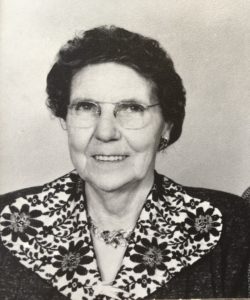
My Grandma Johnson, née Bertha Hafstad, born in 1876, immigrated to Canada from Norway in 1908. I often wonder how she felt, waving her last goodbyes to family and friends on shore. She was thirty-two and still single. A Spinster, Old Maid. Had there been love lost? No prospects? As was common at that time, she came to perform domestic duties for her younger brother, John. I suspect that the marriage prospects were promising in a land where many bachelors were forging new futures on free government granted homesteads.
One such bachelor was John’s Norwegian friend, Emil Johnson. Bertha and Emil were married January 27, 1909. He had a quarter section homestead on a sere, barren plot of land near Enchant, Alberta. There, my grandmother began her new life as a Homesteader’s Bride. My grandfather was clear about his intentions as he described them in a 1964 newspaper article: “While I was working in Wardner, I met a girl and we were married. I had made up my mind I would not go back to the homestead alone and do all the work alone. Cooking pancakes and working outdoors was too much for one man.”
I do not know what she expected from that union but I am sure that she dreamed of more than a very “Unenchanting”, isolated, one room sod shack on the windswept prairie.
Norway is a magnificent land of craggy mountains, verdant forests, and ultramarine fjords. Her heart must have plummeted as she surveyed her new surroundings.
On a list she wrote many years later, I found the names and birth dates of her children who lived to adulthood:
1909…Astrid
1911…Agnar, my father
1913…Borghild
1914…Adolf
1917…Gustof
1919…Torval
1921…Dagny
Missing were at least three deceased children, including twins. Ten children, twelve years! Her age thirty-three to forty-five.
With only a suspended blanket for privacy, Grandma often tried to birth her babies in silence so she would not wake the other children or attract their attention. How could those births have been joyful occasions to celebrate? Another mouth to feed. Another cry to be answered.
My aunt Astrid, the eldest daughter, claimed she never wanted children of her own. The memory of exhausting years tending her siblings destroyed her interest in motherhood. Crops were poor and food was scarce on a farm that should have remained grassland.
Sometimes the only available protein was from Prairie Gophers. Sinewy scrawny Crop Robbers who yielded little sustenance. Children and horses grew thin. Hard labor reaped minimal results. Grandma labored in the field. She labored in the kitchen. She labored in the nursery. She labored to save her babies from Influenza. Sometimes, she failed. Cause for many tears, rarely shed. Grandma stoically persevered. It was The Norwegian Way.
Grandpa was often absent. Literally seeking greener pastures. Probably not hurrying home.Too crowded. Too noisy. Too many children to feed. Grandma would manage. And she did. In 1924, the family moved to a more productive farm in Granum, Alberta. Life improved. Her eldest daughter was only 13 so Grandma still kept grueling hours in field and home.
Eventually, children grew up and prosperity replaced scarcity. They acquired more farms and relocated into town. I never heard Grandma complain about her past, her husband, or her children. She held her tongue and kept far more secrets than she ever told. When widowed, she maintained her own home. Still baking bread in her nineties. She remained solid. Dependable. Resourceful.
At 92, she became locally famous as the oldest voter in town during a Federal Election. Her photo was in the newspaper. She looked strong, healthy, and robust. She had faithfully voted in every Federal Election since women gained the right to vote.
Grandma knew her responsibilities in life. She shouldered them with courage, determination, and tenacity. Cooking pancakes, working outdoors and working indoors was not too much for one woman. At least not That One Woman!
I am proud of her. I hope, someday, my grandchildren can say the same of me.
Dr J’s Comments
A story describing the heart and strength of rural grandmothers like Bertha Johnson. Her life honors the hard-working and dedicated rural wives, mothers, and community members. This was written by her granddaughter.
Very touching!
Especially the part about her having babies in silence so not to alarm the other children. Jeepers!
My Grandmother always said to every tragedy “it could have been worse”, I often think that attitude got those people though really really tuff times. Most of us would have given up and moved back east, where life appeared to be easier. Where they got the daily conviction to struggle on, I greatly respect. So much responsibility for others, and not just self may have been a part of it. God bless them for I exist as a result
Oh, Harold – isn’t that the truth! I have always been aware and grateful for the women who came before me: mother, grandmother, aunts, neighbors, teachers (imagine who I would have been without Mrs. Keenan:).